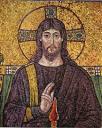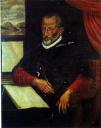Saint of the Day: St. Thomas Aquinas – January 28
St. Thomas Aquinas, the Angelic Doctor (c. 1225 – 1274), has been and continues to be one of the most influential forces shaping Catholic theology and philosophy. He was born at Roccasecca castle, the home of his father, Count Landulf, in the Kingdom of Naples. His mother was Theodora, Countess of Theate, and was related to the Hohenstafuen dyanasty of Holy Roman emperors. St. Thomas’s uncle, Sinbald, was the abbot of the first Benedictine monastery, Monte Cassino, and the family planned for him to succeed his uncle as abbot.
At the age of 5, St. Thomas was sent to Monte Cassino to begin his studies. At 16 he was sent to the University of Naples, where he came under the influence of the Order of Preachers – the Dominicans -who were innovators in a new style of religious life very different from that of traditional orders such as the Benedictines. St. Thomas upset his family by announcing his intention of joining the Dominicans. This action not only destroyed the family’s ambition to retain the power and prestige of Monte Cassino, but it was almost akin to running off with a band of hippies. Unable to convince him to renounce this foolishness, his family kidnapped him and held him for a year in the family castle of San Giovanni. Finally, Pope Innocent IV intervened and St. Thomas joined the Dominicans at 17.
St. Thomas and the Dominicans of his time introduced an entirely new way of approaching the faith. For 12 centuries, the Church teachers of the faith appealed to the authority of the scriptures and previous teachers such as St. Augustine or other Fathers of the Church. The scholastic movement, embodied by St. Thomas and his teacher St. Albert the Great, began with an open inquiry based on logic and reason. The traditional Faith was accepted as true, but thoughtful and logical reason were presented as to why it might not be true. Ultimately, various statements of belief were upheld, not only on the authority of the Church or tradition, but by reason and logic as well.
The format of the scholastic argument is the back bone of St. Thomas’s two major works, The Summa Theologica and the Summa Contra Gentiles. It is hard for us as post-modern people to imagine what a daring and threatening approach this was for the time. In fact the 1200s were a time of immense change in Europe. Trade and communications with the East had been reopened and with them came a flood of new and ancient knowledge. Trade and commerce increased the power and prestige of market towns at the expense of the countryside. Monastic schools gave way to early universities. The great Cathedrals began to dominate the landscape. The traditional clergy were overshadowed by the two great orders of mendicant friars (the begging brothers) – the Dominicans and the Franciscans.
St. Thomas, and his contemporary members of the scholastic movement, absorbed and transformed Islamic and Greek philosophy, science, technology, and mathematics. In particular, the Thomistic school of scholasticism is known for reviving the philosophy of Aristotle and its logic.
Over the centuries, scholastic philosophy would evolve and change in a variety of ways and St. Thomas – contrary to his own method – became the authority. Instead of being a fresh and bold inquiry, scholasticism degenerated into a catalog of arguments and answers to be memorized and repeated. In the Enlightenment of the 17th and 18th centuries, scholasticism and Thomism were disregarded by secular philosophies reliant only on reason. Thomism was also marginalized in training programs for priests.
In the late 1800s, there was a movement to restore Thomism as a defense against the secular philosophies of the Enlightenment and to renew some intellectual vigor in Catholic circles. It was an attempt to come to grips with the modern world and met heavy resistance. In the early 1900s, Thomism began to assume some prominence and neo-Thomism emerged with a renewed interest in the relationship between faith and reason. It is a long and complicated story, but it reflects the enduring importance of the work of St. Thomas and the changing moods of society and philosophy.
The core question persists. What can we know of God through reason? The second question follows. How reasonable is our faith?
If we want to honor a man who was a mystic, a saint, and an intellectual, it seems that we have to take on the openness of his inquiry and the wonder he beheld in faith.
Read More
























